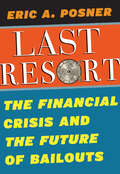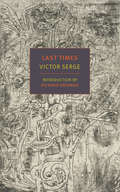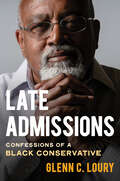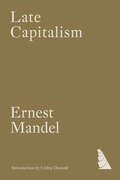- Table View
- List View
Last Place Called Home: A Novel
by Betsy HartmannAs the secret federal sting operation Snakehead targets the fentanyl trade, the small mill town of Stanton, Massachusetts, becomes a battlefield in the war on drugs. In the midst of this turmoil, three mothers—newspaper reporter Laura Everett, businesswoman Mimi Sullivan, and machinist Angie Gillen—must overcome their differences and confront their pasts to keep their troubled teenagers out of the crossfire. Help comes from two Stanton cops who break ranks after discovering Snakehead’s hidden agenda. Stakes rise as the opioid crisis deepens and Mimi’s daughter sinks further into heroin addiction. Laura and Angie’s sons try to save her, but their efforts only place her at greater risk. Ultimately, the deadly violence threatening the community compels Laura to dig deep within herself for the power to take charge. A fast-paced, multilayered thriller that spotlights the high human costs of the drug war, Last Place Called Home is also a story about love and loyalty to family, friends, and place. Stanton is a hard place to live in—but it’s an even harder place to leave.
Last Resort: The Financial Crisis and the Future of Bailouts
by Eric A. PosnerThe bailouts during the recent financial crisis enraged the public. They felt unfair—and counterproductive: people who take risks must be allowed to fail. If we reward firms that make irresponsible investments, costing taxpayers billions of dollars, aren’t we encouraging them to continue to act irresponsibly, setting the stage for future crises? And beyond the ethics of it was the question of whether the government even had the authority to bail out failing firms like Bear Stearns and AIG. The answer, according to Eric A. Posner, is no. The federal government freely and frequently violated the law with the bailouts—but it did so in the public interest. An understandable lack of sympathy toward Wall Street has obscured the fact that bailouts have happened throughout economic history and are unavoidable in any modern, market-based economy. And they’re actually good. Contrary to popular belief, the financial system cannot operate properly unless the government stands ready to bail out banks and other firms. During the recent crisis, Posner agues, the law didn’t give federal agencies sufficient power to rescue the financial system. The legal constraints were damaging, but harm was limited because the agencies—with a few exceptions—violated or improvised elaborate evasions of the law. Yet the agencies also abused their power. If illegal actions were what it took to advance the public interest, Posner argues, we ought to change the law, but we need to do so in a way that also prevents agencies from misusing their authority. In the aftermath of the crisis, confusion about what agencies did do, should have done, and were allowed to do, has prevented a clear and realistic assessment and may hamper our response to future crises. Taking up the common objections raised by both right and left, Posner argues that future bailouts will occur. Acknowledging that inevitability, we can and must look ahead and carefully assess our policy options before we need them.
Last Rights: The Road to Redemption Series (The Road to Redemption #6)
by James GreenSixth in the Road To Redemption series that was shortlisted for the Specsavers Crime Thriller AwardsJimmy Costello has lived his life on both sides of the law but, when it comes to the art world, he's out of his depth.When a stolen art scandal envelopes the Catholic Church in Vancouver, Jimmy's boss in Rome sends him to clear it up. Jimmy works hard but he's tired and fears he's losing his touch. There's only one way to unravel this tightly-wound knot - someone has to cut it.
Last Rights: The Road to Redemption Series (The\road To Redemption Ser. #6)
by James GreenSixth in the Road To Redemption series that was shortlisted for the Specsavers Crime Thriller AwardsJimmy Costello has lived his life on both sides of the law but, when it comes to the art world, he's out of his depth.When a stolen art scandal envelopes the Catholic Church in Vancouver, Jimmy's boss in Rome sends him to clear it up. Jimmy works hard but he's tired and fears he's losing his touch. There's only one way to unravel this tightly-wound knot - someone has to cut it.
Last Scene Underground: An Ethnographic Novel of Iran
by Roxanne VarziLeili could not have imagined that arriving late to Islamic morals class would change the course of her life. But her arrival catches the eye of a young man, and a chance meeting soon draws Leili into a new circle of friends and artists. Gathering in the cafes of Tehran, these young college students come together to create an underground play that will wake up their generation. They play with fire, literally and figuratively, igniting a drama both personal and political to perform their play--just once. From the wealthy suburbs and chic coffee shops of Tehran to subterranean spaces teeming with drugs and prostitution to spiritual lodges and saints' tombs in the mountains high above the city, Last Scene Underground presents an Iran rarely seen. Young Tehranis navigate their way through politics, art, and the meaning of home and in the process learn hard lessons about censorship, creativity, and love. Their dangerous discoveries ultimately lead to finding themselves. Written in the hopeful wake of Iran's Green Movement and against the long shadow of the Iran-Iraq war, this unique novel deepens our understanding of an elusive country that is full of misunderstood contradictions and wonder.
Last Snow (Jack McClure Series #2)
by Eric Van LustbaderNew York Times bestselling sensation Eric Van Lustbader created the legendary Nicholas Linnear of The Ninja and brought Jason Bourne into the twenty-first century. Now Lustbader brings us Jack McClure, a street-smart ATF agent who saved the president's daughter from a criminal mastermind. Jack is now a special advisor to President Edward Carson, and Carson's daughter refuses to let Jack out of her sight. When an American senator, supposedly on a political trip to the Ukraine, turns up dead on the island of Capri, the president asks McClure to find out how and why. Jack sets out from Moscow across Eastern Europe, following a perilous trail of diplomats, criminals, and corrupt politicians. He takes on a personal mission along with his official one: protecting his two unlikely, unexpected, and incompatible companions--Annika, a rogue Russian FSB agent, and Alli, the president's daughter. Thrust into the midst of a global jigsaw puzzle, Jack uses his dyslexic mind to put together the pieces that others can't even see. As he struggles to keep both women safe and to unearth the answers he seeks, Jack learns just how far up the American and Russian political ladders corruption and treachery have reached. And though Jack's abilities are as good as it gets, there is much more to gain--and lose--on this journey than the truth about the senator....
Last Things (The Strangers and Brothers Novels)
by C.P. SnowA brush with death may finally bring a father and son together, in the conclusion to the award-winning, decades-spanning series. Sir Lewis Eliot has made his way from a deprived childhood to knighthood, but when he experiences cardiac arrest during surgery, his thoughts turn to the meaning of it all. As he considers a life spent in the realms of law, government, and academia, he can&’t refrain from passing judgment on himself. Yet amid his melancholy musings about age and infirmity, Eliot finds his characteristic optimism has not deserted him—and looks to the future in the form of his adult son, who is part of a new generation he struggles to understand, but who remains as beloved as the day he was born . . . &“As with [John] Galsworthy, Snow&’s respectable achievement has been to make honest drama out of the undramatic stuff of compromise.&” —Time &“A master craftsman in fiction.&” —The New York Times
Last Times
by Victor SergeA story of displacement and resistance during the early days of the Nazi occupation of France.Last Times, Victor Serge&’s epic novel of the fall of France, is based—like much of his fiction—on firsthand experience. The author was an eyewitness to the last days of Paris in June 1940 and joined the chaotic mass exodus south to the unoccupied zone on foot with nothing but his manuscripts. He found himself trapped in Marseille under the Vichy government, a persecuted, stateless Russian, and participated in the early French Resistance before escaping on the last ship to the Americas in 1941.Exiled in Mexico City, Serge poured his recent experience into a fast-moving, gripping novel aimed at an American audience. The book begins in a near-deserted Paris abandoned by the government, the suburbs already noisy with gunfire. Serge&’s anti-fascist protagonists join the flood of refugees fleeing south on foot, in cars loaded with household goods, on bikes, pushing carts and prams under the strafing Stukas, and finally make their way to wartime Marseille. Last Times offers a vivid eyewitness account of the city&’s criminal underground and no less criminal Vichy authorities, of collaborators and of the growing resistance, of crowds of desperate refugees competing for the last visa and the last berth on the last—hoped-for—ship to the New World.
Last Train to Auschwitz: The French National Railways and the Journey to Accountability
by Sarah FedermanIn the immediate decades after World War II, the French National Railways (SNCF) was celebrated for its acts of wartime heroism. However, recent debates and litigation have revealed the ways the SNCF worked as an accomplice to the Third Reich and was actively complicit in the deportation of 75,000 Jews and other civilians to death camps. Sarah Federman delves into the interconnected roles—perpetrator, victim, and hero—the company took on during the harrowing years of the Holocaust. Grounded in history and case law, Last Train to Auschwitz traces the SNCF’s journey toward accountability in France and the United States, culminating in a multimillion-dollar settlement paid by the French government on behalf of the railways.The poignant and informative testimonies of survivors illuminate the long-term effects of the railroad’s impact on individuals, leading the company to make overdue amends. In a time when corporations are increasingly granted the same rights as people, Federman’s detailed account demonstrates the obligations businesses have to atone for aiding and abetting governments in committing atrocities. This volume highlights the necessity of corporate integrity and will be essential reading for those called to engage in the difficult work of responding to past harms.
Last Train to Auschwitz: The French National Railways and the Journey to Accountability
by Sarah FedermanIn the immediate decades after World War II, the French National Railways (SNCF) was celebrated for its acts of wartime heroism. However, recent debates and litigation have revealed the ways the SNCF worked as an accomplice to the Third Reich and was actively complicit in the deportation of 75,000 Jews and other civilians to death camps. Sarah Federman delves into the interconnected roles—perpetrator, victim, and hero—the company took on during the harrowing years of the Holocaust. Grounded in history and case law, Last Train to Auschwitz traces the SNCF’s journey toward accountability in France and the United States, culminating in a multimillion-dollar settlement paid by the French government on behalf of the railways.The poignant and informative testimonies of survivors illuminate the long-term effects of the railroad’s impact on individuals, leading the company to make overdue amends. In a time when corporations are increasingly granted the same rights as people, Federman’s detailed account demonstrates the obligations businesses have to atone for aiding and abetting governments in committing atrocities. This volume highlights the necessity of corporate integrity and will be essential reading for those called to engage in the difficult work of responding to past harms.
Last Weapons: Hunger Strikes and Fasts in the British Empire, 1890–1948 (Berkeley Series in British Studies #16)
by Kevin GrantLast Weapons explains how the use of hunger strikes and fasts in political protest became a global phenomenon. Exploring the proliferation of hunger as a form of protest between the late-nineteenth and mid-twentieth centuries, Kevin Grant traces this radical tactic as it spread through trans-imperial networks among revolutionaries and civil-rights activists from Russia to Britain to Ireland to India and beyond. He shows how the significance of hunger strikes and fasts refracted across political and cultural boundaries, and how prisoners experienced and understood their own starvation, which was then poorly explained by medical research. Prison staff and political officials struggled to manage this challenge not only to their authority, but to society’s faith in the justice of liberal governance. Whether starving for the vote or national liberation, prisoners embodied proof of their own assertions that the rule of law enforced injustices that required redress and reform. Drawing upon deep archival research, the author offers a highly original examination of the role of hunger in contesting an imperial world, a tactic that still resonates today.
Last in Their Class
by James RobbinsToday's Goat, the West Point cadet finishing at the bottom of his class, is temporary celebrity among his classmates. But in the 19th century, he was something of a cult figure. Custer's contemporaries at the Academy believed that the same spirit of adventure that led him to carouse at local taverns motivated his dramatic cavalry attacks in the Civil War and afterwards. And the same willingness to accept punishment from Academy authorities also sent George Pickett into the teeth of the Union guns at Gettsyburg. The story James S. Robbins tells goes from the beginnings of West Point through the carnage of the Civil War to the grassy bluffs over the Little Big Horn. The Goats he profiles tell us much about the soul of the American solider, his daring, imagination and desire to prove himself against high odds.
Last of the Cold War Spies: The Life of Michael Straight
by Roland PerryThe full and complete portrait of Michael Straight, a secret agent and last of the Cold War spies.
Last of the Pirates: The Search for Bob Denard
by Samantha WeinbergThis riveting book gives an account of an intrepid young woman's eccentric quest, as Samantha Weinberg pursues one of the last of a dying breed: an elusive French mercenary who plied his trade, ruthlessly, throughout the African continent. The Comoros are small specks in the Indian Ocean, four volcanic islands known for their beauty and for ylang-ylang, an exotic flower whose extract is widely used in French perfumes. For many years they were also the home of Bob Denard, who arrived by way of Katanga, the Congo, Yemen, Angola, Biafra, Gabon, and Benin. Once in the Comoros, he overthrew two presidents in three years. In 1989 he, too, was overthrown, and then he disappeared. Last of the Pirates is a thrilling story of beauty, intrigue, cruelty, and murder: a book about an exotic place few of us have ever imagined, and about a murderous, machista culture that aimed to transform it.
Last to Eat, Last to Learn: My Life in Afghanistan Fighting to Educate Women
by Pashtana Durrani Tamara BraloA Ms. Magazine Pick for Most Anticipated Feminist Books of 2023&“Pashtana&’s story highlights the resourcefulness and bravery of young women in Afghanistan. I hope readers will be inspired by her mission to give every girl the education she deserves and the opportunity to pursue her dreams.&”—Malala Yousafzai In the spirit of I am Malala and Our House is On Fire by Greta Thunberg, this is the astonishing true story of the Malala Fund Education Champion Award-winner, founder of the NGO LEARN, and women&’s education activist whose advocacy for the disappearing girls of rural Afghanistan has led to her being ruthlessly targeted by the Taliban. Inspired by generations of her family&’s unwavering belief in the power of education, Pashtana Durrani recognized her calling early in life: to educate Afghanistan&’s girls and young women, raised in a society where learning is forbidden. In a country devastated by war and violence, where girls are often married off before reaching their teenage years and prohibited from leaving their homes, heeding that call seemed both impossible and dangerous. Pashtana was raised in an Afghan refugee camp in Pakistan where her father, a tribal leader, founded a community school for girls within their home. Fueled by his insistence that despite being a girl, she mattered and deserved an education, Pashtana was sixteen when, against impossible odds, she was granted a path out of the refugee camp: admittance to a preparatory program at Oxford. Unthinkably and to her parents&’ horror, she chose a different path. She chose Afghanistan. Pashtana founded the nonprofit LEARN and developed a program for getting educational materials directly into the hands of girls in remote areas of the country, training teachers in digital literacy. Her commitment to education has made her a target of the Taliban. Still, she continues to fight for women&’s education and autonomy in Afghanistan and beyond. Courageous and inspiring, Last to Eat, Last to Learn is the story of how just one person can transform a family, a tribe, a country. It reminds us of the emancipatory power of learning and the transformational potential that lies within each of us.
Lasting Value: Open Space Planning and Preservation Successes
by Rick PruetzAmericans are committing 'country-cide', says Rick Pruetz, FAICP, converting farms into suburban yards and channeling streams that once provided flood control, water purification, habitats, and recreational opportunities. But rather than rail against overdevelopment, this book celebrates communities succeeding in preservation. For ten years Pruetz explored communities that excel in saving their natural environment. In twenty-four illustrated vignettes, he captures the character of places from the volcanic range near downtown Albuquerque, New Mexico, to Minneapolis’s Grand Rounds park system, to farmland improbably preserved on Long Island. As the longtime city planner of Burbank, California, Pruetz offers more than an appreciation of these communities. He brings a planner’s-eye view of the practices behind their achievements. His detailed reports of creative preservation solutions mark the trail for planners, commissioners, and citizens who seek to preserve the green legacy in their own backyards.
Latac a la raó
by Al Gore«Mai no ha estat tan important que encarem la realitat dels nostres reptes a llarg termini, des de la crisi del clima fins a la guerra de lIraq, passant per moltes altres qüestions. La raó és atacada per forces que fan servir tècniques sofisticades, com la propaganda, la psicologia i els medis de comunicació electrònics. Tot i que els reptes als quals ens enfrontem són grans, tinc més confiança que mai en el fet que la democràcia triomfarà i que estarem a lalçada del desafiament. Espero que els que llegeixin aquest llibre decideixin formar part dun nou moviment que ho faci possible.» Al Gore
Late Admissions: Confessions of a Black Conservative
by Glenn LouryA shockingly frank memoir from a prize-winning economist, reflecting on his remarkable personal odyssey and his changing positions on identity, race, and belief. Economist Glenn C. Loury is one of the most prominent public intellectuals of our time: he’s often radically opposed to the political mainstream, and delights in upending what’s expected of a Black public figure. But more so than the arguments themselves—on affirmative action, institutional racism, Trumpism—his public life has been characterized by fearlessness and a willingness to recalibrate strongly held and forcefully argued beliefs. Loury grew up on the south side of Chicago, earned a PhD in MIT’s economics program, and became the first Black tenured professor of economics at Harvard at the age of thirty-three. He has been, at turns, a young father, a drug addict, an adulterer, a psychiatric patient, a born-again Christian, a lapsed born-again Christian, a Black Reaganite who has swung from the right to the left and back again. In Late Admissions, Loury examines what it means to chart a sense of self over the course of a tempestuous, but well-considered, life.
Late Capitalism
by Ernest MandelLate Capitalism is the first major synthesis to have been produced by the contemporary revival of Marxist economics. It represents, in fact, the only systematic attempt so far ever made to combine the general theory of the "laws of motion" of the capitalist mode of production developed by Marx, with the concrete history of capitalism in the twentieth century.Mandel's book starts with a challenging discussion of the appropriate methods for studying the capitalist economies. He seeks to show why the classical approaches of Luxemburg, Bukharin, Bauer and Grossman failed to accomplish the further development of Marxist theory whose urgency became evident after Marx&’s death. He then sketches the structure of the world market and the variant types of surplus-profit that have characterized its successive stages. On these foundations Late Capitalism proceeds to advance an extremely bold schema of the "long waves" of expansion and contraction in the history of capitalism, from the Napoleonic Wars to the present. Mandel criticizes and refines Kondratieff&’s famous use of the notion.Mandel&’s book surveys in turn the main economic characteristics of late capitalism as it has emerged in the contemporary period. The last expansionary long wave, it argues, started with the victory of fascism on the European continent and the advent of the war economies in the US and UK during the 1940s, and produced the record world boom of 1947-72. Mandel discusses the reasons why the dynamic upswing of growth in this period was bound to reach its limits at the turn of the 1970s, and why a long wave of economic stagnation and intensified class struggle has set in today.Late Capitalism is a landmark in Marxist economic literature. Specifically designed to explain the international recession of the 1970s, it is a central guide to understanding the nature of the world economic crisis today.
Late Capitalist Fascism (Theory Redux)
by Mikkel Bolt RasmussenWhat if fascism didn’t disappear at the end of WW II with the defeat of Hitler and Mussolini? Even more troubling, what if fascism can no longer be confined to political parties or ultra nationalist politicians but has become something much more diffuse that is spread across our societies as cultural expressions and psychological states? This is the disturbing thesis developed by Mikkel Bolt Rasmussen, who argues that late capitalism has produced hollowed-out and exchangeable subjectivities that provide a breeding ground for a new kind of diffuse, banal fascism. The overt and concentrated fascism of the new fascist parties thrives on the diffuse fascism present in social media and everyday life, where the fear of being left behind and losing out has fuelled resentment towards foreigners and others who are perceived as threats to a national community under siege. Only by confronting both the overt fascism of parties and politicians and the diffuse fascism of everyday life will we be able to combat fascism effectively and prevent the slide into barbarism.
Late Capitalist Freud in Literary, Cultural, and Political Theory
by Robbie McLaughlan Maria-Daniella DickLate Capitalist Freud in Literary, Cultural, and Political Theory proposes that late Freudian theory has had an historical influence on the configuration of contemporary life and is central to the construction of twenty-first-century capitalism. This book investigates how we continue to live in the Freudian century, turning its attentions to specific crisis points within neoliberalism—the rise of figures like Trump, the development of social media as a new superego force, the economics that underpin the wellness and self-care industries as well as the contemporary consumption of popular culture—to maintain the continued historical importance of Freudian thought in all its dimensions. Drawing on psychoanalytic theory, literary theory, cultural studies, and political theory, this book assesses the contribution that an historical and theoretical consideration of the late Freud can make to analyzing certain aspects of late capital.
Late Churchill: Language from Crisis to Death (Routledge Interdisciplinary Perspectives on Literature)
by Jonathan Locke HartThis book focuses on a close analysis of selected speeches of Winston Churchill in the House of Commons and some of the responses from fellow MPs from the middle of 1940 to the death of Churchill in 1965, speeches in war and peace, and concentrates on foreign affairs. The book will appeal to those interested in Churchill, freedom, tyranny, diplomacy, war and conflict, democracy, politics, the Second World War, the Cold War, Britain, Canada, the United States, the British Empire and Commonwealth, Europe, France, Asia, Germany, Japan, totalitarianism, Parliament, legislative assemblies, rhetoric, language, style, speech-writing, oral and written communication, literature, history and other areas. The debate between autocracy (tyranny, totalitarianism) and democracy is in those times and ours, with many parallels, chilling. Churchill was key to our world history and is a key to understanding what is at stake in the world now.
Late City: A Novel
by Robert Olen ButlerThe Pulitzer Prize–winning author shares an “exceptionally nuanced, tender, funny, tragic, and utterly transfixing portrait” of one man’s troubled century (Booklist, starred review).At 115 years old, former newspaperman Sam Cunningham is also the last surviving veteran of World War I. As he prepares to die in a Chicago nursing home, the results of the 2016 presidential election come in—and he finds himself in a wide-ranging conversation with a surprising God. As the two review Sam’s life, the grand epic of the twentieth century comes sharply into focus.Sam grows up in Louisiana under the flawed morality of an abusive father. Eager to escape, Sam enlists in the army while still underage. Though the hardness his father instilled in him helps him make it out of World War I alive, it also prevents him from contending with the emotional wounds of war. Back in the United States, Sam moves to Chicago to begin a career as a newspaperman that will bring him close to the major historical turns of the twentieth century. There he meets his wife and has a son, whose fate counters Sam’s at almost every turn.As he contemplates his relationships—with his parents, his brothers in arms, his wife, his editor, and most importantly, his son—Sam is amazed at what he still has left to learn about himself after all these years.
Late Fascism: Race, Capitalism and the Politics of Crisis
by Alberto ToscanoHow do we understand the return of fascism today?In a world shaken by ecological, economic and political crises, the forces of authoritarianism and reaction seem to have the upper hand. How should we name, map and respond to this state of affairs?Late Fascism turns to theories of fascism produced in the past century, testing their capacity to illuminate our moment and challenging many of the commonplaces that debate on this extremely charged term devolves into. It can be tempting for any contemporary assessment of fascism to reach for historical analogy. Fascism is defined by returns and repetitions, but it is not best approached in terms of steps and checklists dictated by a selective reading of Italian Fascism or National Socialism.Rather than treating fascism as an unrepeatable phenomenon or identifying it with a settled configuration of European parties, regimes, and ideologies, Toscano approaches fascism as a problem and a process, one that is intimately linked to capitalism's demands for domination. Drawing especially on Black radical and anti-colonial theories of racial fascism, Late Fascism makes clear the limits of identifying fascism simply with the political violence of bygone European regimes. Developing anti-fascist theory is a vital and urgent task. From the "Great Replacement" to campaigns against critical race theory and "gender ideology", today's global far-right is launching lethal panics about the threats to traditional political, sexual and racial regimes. Late Fascism allows us to rediscover some truly inspiring anti-fascist thinkers, rooted in their turn in largely anonymous collective practices of worldmaking against domination, traditions of the oppressed that remain a resource for those set on dismantling the hierarchies and segregations that the partisans of Order and Tradition seek to revive and reimpose.
Late Marx and the Russian Road: Marx and the Peripheries of Capitalism (Monthly Review Press Classic Titles #26)
by Teodor ShaninExplores Marx’s attitude to “developing” societies. Includes translations of Marx’s notes from the 1880s, among the most important finds of the last century.






















